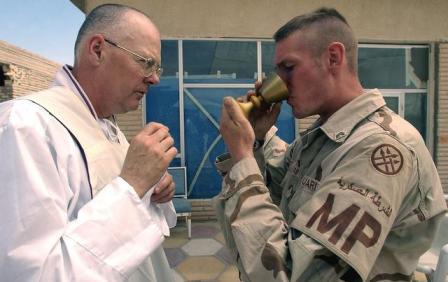Author: Dr. James H. Toner | Source: Catholics in the Military

WHAT MILITARY ETHICS IS ALL ABOUT
- "An act performed pursuant to an unlawful order is excused unless the accused knew it to be unlawful or a person of ordinary sense and understanding would have known it to be unlawful" (Manual for Courts-Martial, Rule 916).
- "[Natural law] is written and engraved in the mind of every man . . . commanding us to do right and forbidding sin" (Pope Leo XIII, On the Nature of Human Liberty [8]).
Having spoken to numerous civic, religious, and college audiences about military ethics, I am continually saddened by the misunderstandings which numerous people have about the conscience of a soldier. One priest, for example, told me that soldiers are mere robots who must obey all orders. A nun told me that no faithful Catholic could serve in today's U.S. armed forces. The head of a theology department at a Catholic college refused to have a discussion with me because I teach ethics at a war college.
Although I currently am involved with character development education at the U.S. Air Force Academy, I am on a two-year leave from the U.S. Air War College (Maxwell AFB, Alabama), where for twelve years I have taught leadership and ethics to (mostly) lieutenant colonels. Before that I taught at a military college, and before that I served for four years as a U.S. Army officer.
I believe in the Church's teaching that we must work toward avoiding war (CCC #2308), and I think that those Catholics whose consciences tell them that they cannot bear arms should be respected and protected. My conscience--also based squarely on Church teaching--tells me that I have a moral obligation to serve in my country's armed forces and that such service is commendable if I carry out my duty "honorably" (CCC #2310). As St. Augustine said, "For the true follower of God even wars are peaceful if they are waged not out of greed or cruelty but for the sake of peace, to restrain the evildoers and assist the good." "A people threatened with an unjust aggression, or already its victim," said Pope Pius XII on Christmas 1948, "may not remain passively indifferent, if it would think and act as befits Christians."
So Catholics may conscientiously choose to become soldiers. What is forbidden to us as Catholic citizen-soldiers is "blind obedience" (CCC #2313, 2242). What often surprises the skeptics in my audiences is that the U.S. military teaches the same principle. "I never expect a soldier to think," wrote George Bernard Shaw in 1897. But American law requires soldiers to think. In fact, no American soldier may follow an order if he knows it is illegal and immoral, or even if he reasonably can be expected to know that an order is illegal and immoral. The Church teaches us that the moral law does not cease when hostilities erupt (CCC#2312), which is, in fact, exactly what soldiers are taught: The defense that "I was just following orders!" is unacceptable. Soldiers have the moral-and legal-responsibility to refuse orders which are immoral
So the Catholic who serves our country in the Armed Forces has to be a conscientious soldier, one whomust obey God before superior officers (cf. Acts 5:29). Although there are military chaplains available to troops, the armed services themselves do not have the responsibility of conducting religious education. Before men and women join the service, they should be reasonably well educated in the teachings of the Church about just war, about authority, and about matters of conscience. When Our Lord said that we should render to Caesar what is Caesar's and to God what is God's, He was less specific than we might like. Similarly, critical decisions, whether political or military, may not always be as clear as we might like.
So the Catholic citizen-soldier accepts the teaching of the Church that we are to "honor all who for our good have received authority in society from God," knowing that they have a right to "expect obedience" from us. We pray that they will exercise their powers with "prudential judgment" (CCC #2234, 1897, 2309). As we have seen, this does not mean that we accept what is dishonorable or that we follow immoral orders. In a vital passage, St. Paul tells us that we are to give taxes and toll, honor and respect, to those to whom they are due (Romans 13:7)
So to the Catholic citizen-soldier (and, of course, others) whom I teach are told that their duty to follow God and their conscience is absolute and unlimited; their duty to follow orders is relative and limited. Catholic soldiers are never excused from trying to know and to do the right thing in the right way at the right time. In fact, they are always "to examine [their] conscience before the Lord's Cross" (CCC #1785). So are we civilians. For this is what Christian ethics is all about. And for the Catholic soldier this is also what military ethics is all about
The men and women, of all faiths and even of none, I have taught now for a quarter-century are not robots; they are not caricatures of human beings; they are not grotesque lovers of violence. They do their best to render to God what is due to God and to our country what is due to our country. They deserve our prayers, our gratitude, our respect. Theirs is often a difficult, demanding, and dangerous profession. But of their faith, those of us who work with airmen and soldiers might say, as Our Lord said to the crowd about another soldier long ago, "I tell you, not even in Israel have I found such faith" (Lk 7:9)
Dr. James H. Toner is the Coors Distinguished Visiting Chair of Character Development at the U.S. Air Force Academy